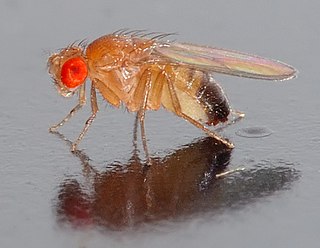Related Research Articles

Invertebrates are animals that neither possess nor develop a vertebral column, derived from the notochord. This includes all animals apart from the subphylum Vertebrata. Familiar examples of invertebrates include arthropods, mollusks, annelid, and cnidarians.
Zoology is the branch of biology that studies the animal kingdom, including the structure, embryology, evolution, classification, habits, and distribution of all animals, both living and extinct, and how they interact with their ecosystems. The term is derived from Ancient Greek ζῷον, zōion, i.e. "animal" and λόγος, logos, i.e. "knowledge, study".

Libbie Henrietta Hyman, was a U.S. zoologist. She wrote numerous works on invertebrate zoology and the widely used A Laboratory Manual for Comparative Vertebrate Anatomy.

Addison Emery Verrill was an American invertebrate zoologist, museum curator and university professor.

The International Commission on Zoological Nomenclature (ICZN) is an organization dedicated to "achieving stability and sense in the scientific naming of animals". Founded in 1895, it currently comprises 27 members from 19 countries, mainly practicing zoological taxonomists.
Hubert Lyman Clark, Ph. D. was an American zoologist.
Invertebrate zoology is the subdiscipline of zoology that consists of the study of invertebrates, animals without a backbone.
Peltidium is a prodorsal shield found in animals of the Subphylum Chelicerata, in the Phylum Arthropoda. In some groups the peltidium, also known as schizopeltid, can be subdivided in: propeltidium, a carapace-like shield that covers the proterosoma, which comprises the fused acron and first four segments; and two free segments, mesopeltidium and metapeltidium.
Maria Maggenti is an American film director and screenwriter for film and television, who has traditionally created independent films. She was the script editor for the American television series, Without a Trace (2003) and has written many episodes for the show as well, but is perhaps best known for her feature film, The Incredibly True Adventure of Two Girls in Love (1995). Her film Puccini for Beginners was in competition at the Sundance Film Festival in January 2006. She was also an activist with ACT UP for many years.

The Museum of Comparative Zoology, full name "The Louis Agassiz Museum of Comparative Zoology", often abbreviated simply to "MCZ", is the zoology museum located on the grounds of Harvard University in Cambridge, Massachusetts. It is one of three natural history research museums at Harvard whose public face is the Harvard Museum of Natural History. Harvard MCZ's collections consist of some 21 million specimens, of which several thousand are on rotating display at the public museum. The current director of the Museum of Comparative Zoology is James Hanken, the Louis Agassiz Professor of Zoology at Harvard University.

In animal anatomy, the mouth, also known as the oral cavity, buccal cavity, or in Latin cavum oris, is the opening through which many animals take in food and issue vocal sounds. It is also the cavity lying at the upper end of the alimentary canal, bounded on the outside by the lips and inside by the pharynx and containing in higher vertebrates the tongue and teeth. This cavity is also known as the buccal cavity, from the Latin bucca ("cheek").
The following outline is provided as an overview of and topical guide to zoology:
Calyx is a term used in animal anatomy for some cuplike areas or structures.

Anguina is a genus of plant pathogenic nematodes.
In parasitology, anthropophilia, from the Greek ἅνθρωπος and φιλία, is a preference of a parasite or dermatophyte for humans over other animals. The related term endophilia refers specifically to a preference for being in human habitats, especially inside dwellings. The term zoophilia, in this context, describes animals which prefer non-human animals for nourishment.

An operculum is an anatomical feature, a stiff structure resembling a lid or a small door that opens and closes, and thus controls contact between the outside world and an internal part of an animal. Examples include:

Arthur Dendy was an English zoologist known for his work on marine sponges and the terrestrial invertebrates of Victoria, Australia, notably including the "living fossil" Peripatus. He was in turn professor of zoology in New Zealand, in South Africa and finally at King's College London. He was a Fellow of the Royal Society.
A megadrile is a kind of worm, a mostly terrestrial oligochaete. Megadriles are placed within the superorder Megadrilacea, and include Moniligastrida and Lumbricina.
Oligosaprobes are organisms that inhabit clean water or water that is only slightly polluted by organic matter. Oxidation processes predominate in such waters owing to an excess of dissolved oxygen. Nitrates are among the nitrogen compounds present; there is little carbonic acid and no hydrogen sulfide. Oligosaprobic environments are aquatic environments rich in dissolved oxygen and (relatively) free from decayed organic matter.

The subcapitulum, also known as infracapitulum, hypognathum or hipognatum, refers to the ventral part of the gnathosoma or the fusion of the palpal coxae and the labrum complex present in some arthropods on which the mouth, pedipalps, mouthparts and pharynx are generally located. It is delimited by the subcapitular apodeme, which separates it from the cheliceral frame.
References
- ↑ Maggenti, Armand R.; Mary Ann Basinger Maggenti; Scott Gardner. "Online Dictionary of Invertebrate Zoology: M". Online Dictionary of Invertebrate Zoology. University of Nebraska, Lincoln. Retrieved 22 May 2014.